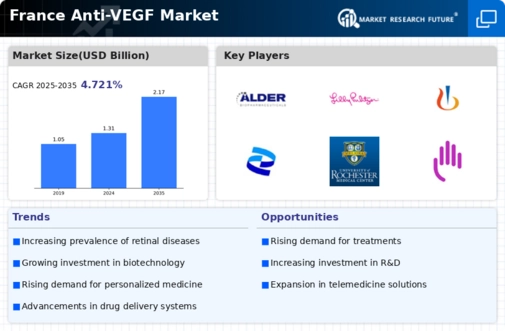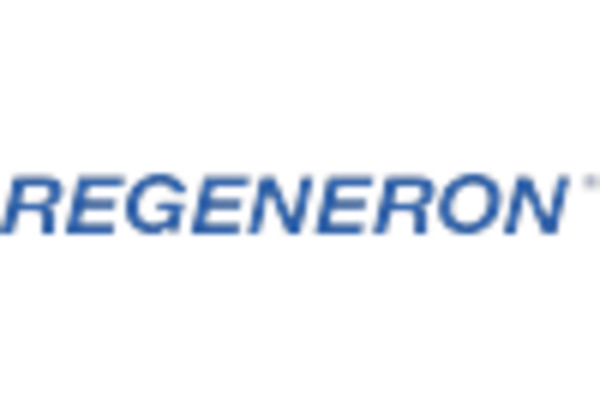Advancements in Clinical Research
The anti vegf market in France is benefiting from significant advancements in clinical research. Ongoing studies are exploring new indications for existing anti-VEGF therapies, which may expand their applications beyond retinal diseases. For instance, recent trials have shown promising results in treating other conditions such as diabetic macular edema and certain types of cancer. This diversification of applications could potentially increase the market size, as more healthcare professionals recognize the versatility of anti-VEGF agents. Additionally, the French government is investing in healthcare research, which may lead to increased funding for clinical trials and innovative treatment approaches. As a result, the anti vegf market is likely to see a surge in new product launches and improved treatment protocols.
Growing Awareness and Education Initiatives
In France, the anti vegf market is witnessing growth driven by increasing awareness and education initiatives regarding retinal diseases. Healthcare organizations and patient advocacy groups are actively promoting awareness campaigns that educate the public about the symptoms and risks associated with conditions like AMD and diabetic retinopathy. This heightened awareness is leading to earlier diagnosis and treatment, which is crucial for effective management of these diseases. As more patients seek treatment, the demand for anti-VEGF therapies is expected to rise. Furthermore, educational programs for healthcare professionals are enhancing their understanding of the latest treatment options, thereby improving patient outcomes and driving the adoption of anti-VEGF therapies in clinical practice.
Technological Innovations in Treatment Delivery
The anti vegf market in France is being propelled by technological innovations in treatment delivery systems. New methods, such as sustained-release implants and advanced injection techniques, are enhancing the efficacy and convenience of anti-VEGF therapies. These innovations not only improve patient compliance but also reduce the frequency of treatments required, which is particularly beneficial for chronic conditions like AMD. The introduction of these advanced delivery systems is likely to attract more patients to seek treatment, thereby expanding the market. Additionally, as healthcare providers adopt these technologies, the overall cost-effectiveness of anti-VEGF therapies may improve, making them more accessible to a broader patient population in France.
Increasing Prevalence of Age-Related Macular Degeneration
The anti vegf market in France is experiencing growth due to the rising prevalence of age-related macular degeneration (AMD). As the population ages, the incidence of AMD is projected to increase, leading to a higher demand for effective treatment options. In 2025, it is estimated that approximately 1.5 million individuals in France will be affected by AMD, which underscores the urgent need for anti-VEGF therapies. This trend is likely to drive investments in research and development within the anti vegf market, as pharmaceutical companies seek to address this growing health concern. Furthermore, the increasing awareness of AMD and its impact on quality of life is prompting healthcare providers to prioritize early diagnosis and treatment, further fueling the demand for anti-VEGF agents.
Supportive Healthcare Policies and Reimbursement Frameworks
The anti vegf market in France is positively influenced by supportive healthcare policies and reimbursement frameworks. The French government has implemented policies that facilitate access to innovative treatments, including anti-VEGF therapies. Reimbursement schemes for these medications are designed to ensure that patients can receive timely and affordable care. As a result, the financial burden on patients is alleviated, encouraging more individuals to seek treatment for retinal diseases. Furthermore, the government’s commitment to improving healthcare access aligns with the objectives of the anti vegf market, fostering an environment conducive to growth. This supportive landscape is likely to attract investments from pharmaceutical companies, further enhancing the availability of anti-VEGF therapies in the market.
















